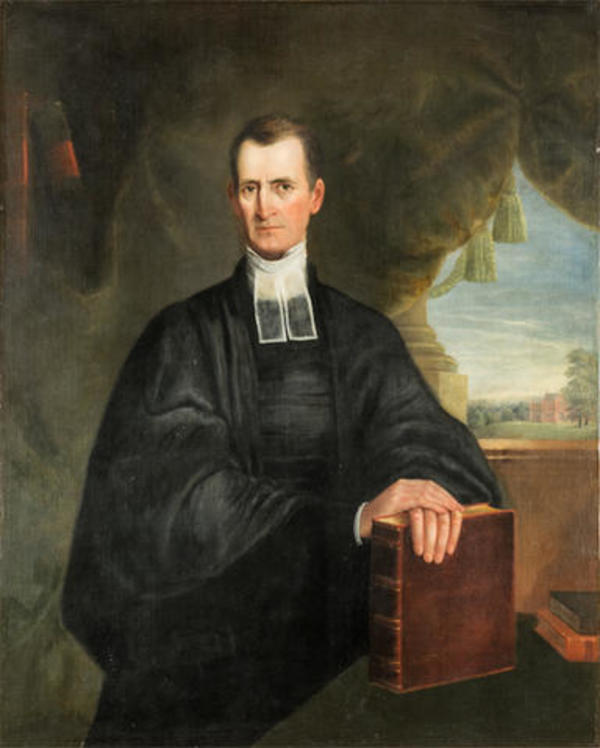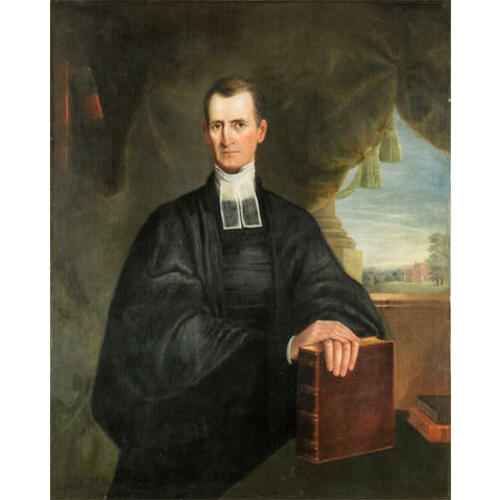
Source: Link
DOOLITTLE, LUCIUS, Church of England minister; b. 23 May 1800, possibly in Lyndon, Vermont, and baptized 30 June 1822 in the parish of Charleston, Hatley, Lower Canada, perhaps the son of Jesse Doolittle, resident of Lyndon in 1800; d. 18 May 1862 at his sister’s home in Milwaukee, Wis., and buried on 30 May in Lennoxville, Canada East.
Lucius Doolittle spent his early years in Hatley where he was engaged in business under an uncle. He entered the University of Vermont in 1824. In 1825–26 he taught school at Hatley, presumably during the long vacations then permitted by the university for that purpose. He was involved in Phi Sigma Nu, a literary society.
In 1818 Doolittle became acquainted with the Reverend Charles James Stewart*, then missionary of the Society for the Propagation of the Gospel in Hatley. Doolittle decided to become a member of the Church of England and was encouraged by both Stewart and Bishop Jacob Mountain* to prepare for the Anglican ministry. In 1827, when he withdrew from the university without completing his course, he was nominated for an SPG scholarship and he read theology under the Reverend Thomas Johnson who had succeeded Stewart at Hatley. He was ordained deacon by Stewart, now bishop of Quebec, in October 1828 and was licensed to a mission on Chaleur Bay. In November 1829 he was ordained priest, and with his wife Clarissa Goss Lawrence, whom he had married the previous month, returned for four arduous years to his mission, stretching 100 miles along the coast.
In October 1833 Doolittle was put in charge of the Eastern Townships mission of Sherbrooke and Lennoxville. He served there until 1847, and in Lennoxville alone from 1847 to 1862. In 1838 he was awarded an honorary ma degree by the University of Vermont.
In 1847, a brick church, called St George’s, was opened, replacing the original wooden church at Lennoxville. Doolittle was foremost in overseeing its construction from 1845 to 1847 and in providing it with suitable furnishings, including a bell and an organ. He obtained a font in Italy when on a visit to Europe in 1852. St Peter’s Church, Sherbrooke, similar to the Lennoxville church, was also built during Doolittle’s incumbency.
George Jehoshaphat Mountain, who was appointed suffragan to Bishop Stewart in 1836 and who became bishop of Quebec in 1837, had long planned to establish a theological seminary in the diocese of Quebec and had considered Trois-Rivières as a possible site. As principal of the nascent McGill University from 1823 to 1835, and president of the Royal Institution for the Advancement of Learning from 1838, Mountain also strove to advance higher education under Anglican auspices in Montreal. But when in 1840 Doolittle and a group of local laymen proposed to locate a seminary combined with a liberal arts college at Lennoxville and offered land and money, the bishop’s agreement was quickly obtained. The growing uncertainty of the status of the church in McGill’s direction undoubtedly influenced Mountain to adopt the Lennoxville plan in which the position of the Church of England would be unquestioned [see John Bethune*]. Doolittle also pointed out that a private school for boys which he had begun in 1836 had gained a measure of success and would provide a feeder for the college.
Bishop’s College, which obtained its charter in 1843, began its long career in 1845 [see Jasper Hume Nicolls*]. Doolittle served as bursar of the college from 1845 to 1856, without remuneration, and he was also a trustee. He bequeathed a capital sum to endow divinity bursaries which are still being awarded. Both contemporaries and later historians give due credit to Doolittle’s part in this large educational venture. Bishop Mountain, in an appreciative reference to Doolittle in his episcopal charge of 1862, asserted: “he may be called, in one sense, the founder of Bishop’s College.” Doolittle’s own foundation was named the “Grammar School in connection with the College,” and continues today as Bishop’s College School.
Because Doolittle published nothing and little of his correspondence remains, his personality is elusive. It is certain from the preamble to his will that he was a man of deep religious faith, closely attached to the church of his adoption. He was untiring in his activities despite much ill health, shrewd in business dealings, sound in judgement, and full of faith in the realization of his dreams. The Reverend Ernest Hawkins, SPG secretary, who visited Lennoxville in 1849, described Doolittle as “a kind, generous, simple hearted man.” Such was the respect accorded to him that Bishop James William Williams*, who had once been in charge of the grammar school, recalled that an invitation to his house was “equivalent to a command which no one would dream of disobeying.” Mrs Doolittle died in 1848. They had no children.
Bishop’s University Library (Lennoxville, Que.), Copy of the last will and testament of Lucius Doolittle, 28 Nov. 1861; Letters of Charles James Stewart to Lucius Doolittle, 1828–35; Letters of George Jehoshaphat Mountain to Lucius Doolittle, 1828–33, 1848. QDA, 53 (B-7), pp.38, 42–43; 68 (B-22), p.80; 91 (D-10); 92 (D-11); 94 (D-13). University of Vermont Archives (Burlington), Annual catalogue, March 1825; Treasurer’s account, 9 Feb. 1825–3 May 1827. USPG, Journal of a visit to British North America and the United States in 1849 by the secretary of the society, Ernest Hawkins (copy at Anglican Church of Canada, General Synod Archives, Toronto). A memoir of George Jehoshaphat Mountain, D.D., D.C.L., late bishop of Quebec . . . , comp. A. W. Mountain (Montreal, 1866). Memoir of the Rev. Archibald Campbell Scarth, M.A., D.C.L., Rector of St George’s Church, Lennoxville . . . , [ed. Henry Roe] (Sherbrooke, Que., 1904). G. J. Mountain, A charge delivered to the clergy of the diocese of Quebec at the triennial visitation . . . on 1st July 1862 (Quebec, 1862); A journal of visitation in a portion of the diocese of Quebec by the lord bishop of Montreal, in 1846 (London, 1847); A journal of visitation to a part of the diocese of Quebec by the lord bishop of Montreal, in the spring of 1843 (London, 1850). Sherbrooke Gazette (Sherbrooke, Que.), 14 June 1862. Soc. for the Propagation of the Gospel in Foreign Parts, Report, 1829, 1830, 1834, 1840. J. W. Williams, A sermon preached by the right reverend the lord bishop of Quebec at the consecration of the chapel of Bishop’s College, Lennoxville, June 14, 1878 (Montreal, 1878). General catalogue of the University of Vermont and State Agricultural College, Burlington, Vermont, 1791–1900 (Burlington, Vt., 1900). D. C. Masters, Bishop’s University, the first hundred years (Toronto, 1950). Parish anecdotes, St James’ Church, 1822–1845; St George’s Church, 1845–1904, ed. Lilian Watson (Lennoxville, Que., [1966]).
Cite This Article
T. R. Millman, “DOOLITTLE, LUCIUS,” in Dictionary of Canadian Biography, vol. 9, University of Toronto/Université Laval, 2003–, accessed February 19, 2026, https://www.biographi.ca/en/bio/doolittle_lucius_9E.html.
The citation above shows the format for footnotes and endnotes according to the Chicago manual of style (16th edition). Information to be used in other citation formats:
| Permalink: | https://www.biographi.ca/en/bio/doolittle_lucius_9E.html |
| Author of Article: | T. R. Millman |
| Title of Article: | DOOLITTLE, LUCIUS |
| Publication Name: | Dictionary of Canadian Biography, vol. 9 |
| Publisher: | University of Toronto/Université Laval |
| Year of publication: | 1976 |
| Year of revision: | 1976 |
| Access Date: | February 19, 2026 |



